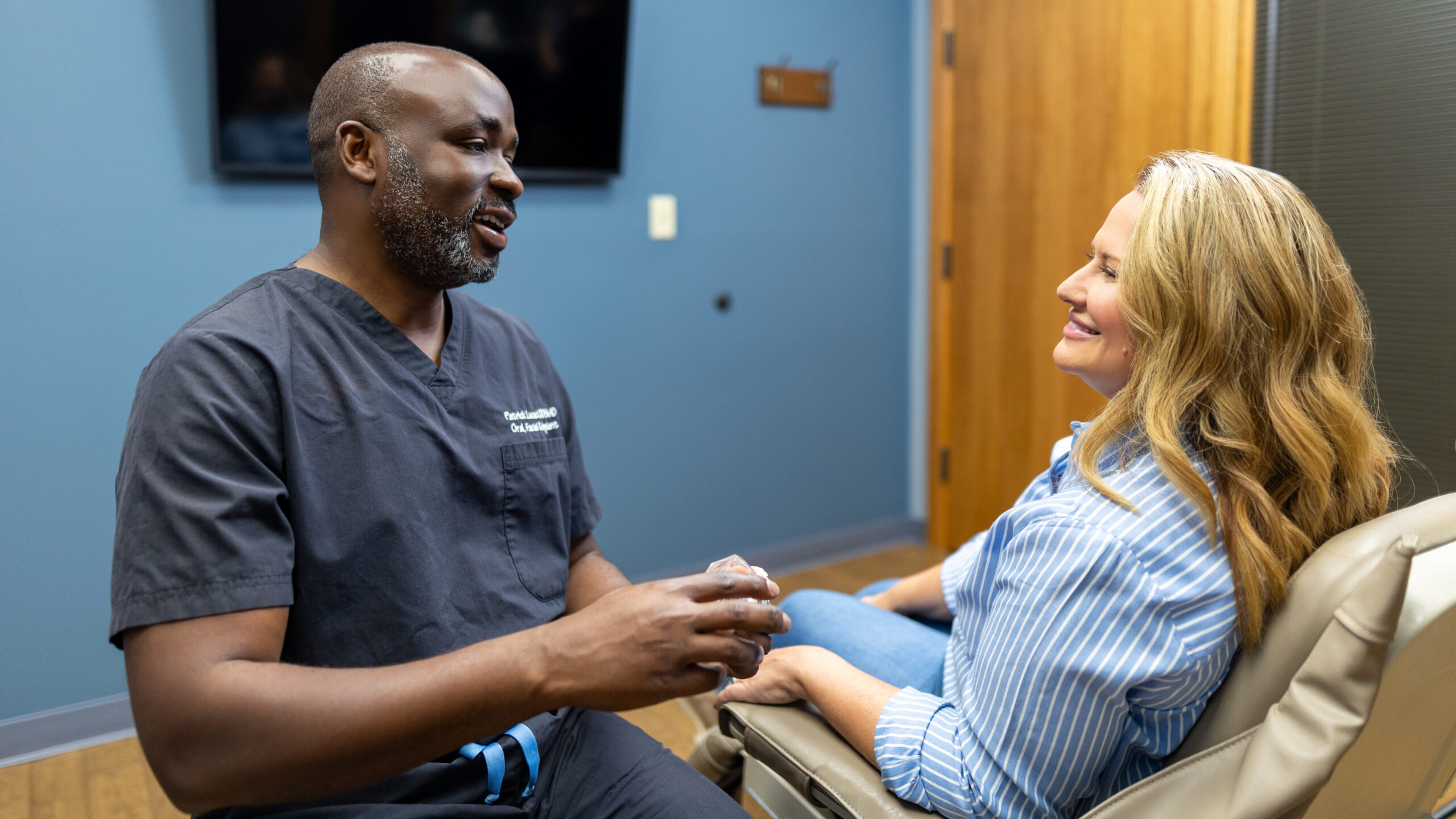Overview

To replace a missing tooth or teeth with a long-lasting restoration, our board-certified oral and maxillofacial surgeons are proud to perform implant dentistry for their patients in Salina, KS. Implant dentistry uses surgically placed posts in your jawbone to act like the root of the tooth. The post(s) may be connected to a bridge, denture, or crown for a beautiful restoration that can be cleaned like natural teeth. To fix a gap in your smile, make an appointment to get more information on implant dentistry at Oral, Facial and Implant Surgery Salina. Dental implants may help if you don’t want to deal with loose crowns or the hassle of removable dentures. Talk to your doctor about what you would like and figure out if implant dentistry is a good option for you.
The Benefits
There are several reasons why you might choose dental implants over other methods for tooth replacement. Some of the primary advantages of implants include:
- According to clinical research, dental implants boast a success rate of 95%.
- With the proper maintenance and care, implants can potentially last a lifetime.
- Unlike other tooth replacement options, dental implants prevent jawbone atrophy.
- Implants offer replacement teeth that look and behave like your natural teeth.
- Dental implants do not require damaging any neighboring, healthy teeth, as is often the case with bridges or dentures.
- You can continue to enjoy all of your favorite foods without worrying about denture slippage.
Best Candidates for Dental Implants
Implants can restore one or several lost teeth by connecting the implant to a crown, denture, or bridge. You may prefer implant dentistry if you have a removable or cemented dental restoration but don’t like the appearance, fit, or if there’s special cleaning needed. Dental implants can be treated just like your normal teeth with daily flossing and brushing. During your consultation, your surgeon will evaluate the health of your jawbone and gums to determine if you are a good candidate for dental implants. In some cases, a bone or gum graft surgery may be needed prior to implant surgery to strengthen your mouth. Dental implants may not be appropriate if you use tobacco products, are pregnant, or are being treated for another issue, such as periodontal disease.
What To Expect
When you have a tooth extracted, your best form of replacement would be a dental implant. Often a bone graft is needed to help form better bone growth around the dental implant. Other anesthesia or sedation may be used to relax you throughout the treatment. Your surgeon will start by making a surgical incision in your gums so the post can be placed in your jawbone. The incision in the gums will be stitched closed with some of the dental implant above the gums. This will be repeated if several implants are required. While the dental implant integrates into the gums and jawbone over the following months, a temporary cover will be placed over the implants. As soon as your doctor decides your implant is healed into your jaw and gums, your permanent restoration (bridge, denture, or crown) can be connected to your implant and adjusted for a comfortable fit.
Recovery
Following your dental implant procedure, you may have some very mild discomfort, but this will subside over the next couple of days. Your surgeon will talk to you about what is to be expected and what should be reported to our office. They may also give you a prescription for pain relievers and antibiotics. After your dental implants are integrated, and your restoration is connected, you should develop a good oral care routine at home that includes daily brushing and flossing as normal. You should also schedule dental exams and professional cleanings at your general dentist about every 3 – 6 months so they can evaluate the health of your mouth and implants. During this visit, they should also check your bite to make sure that there is not too much pressure being placed on your implants. If any issues are detected, they can refer you back to your surgeon to determine if your implant needs to be adjusted or replaced.
Insurance Coverage
Based on your dental insurance company and personal coverage, part of the expenses of your implants and custom restoration might be paid for. At your initial consultation, we may estimate your expenses and discuss payment methods we accept, along with information on low-interest medical financing.
Patient Education
Using Digital Guides to Replace a Missing Tooth with an Implant
Dental Implants
Implants with custom restorations may be a good option if you are looking for a replacement for missing teeth that is simple to care for and can last for many years. Your doctor will explain the steps needed starting with surgery for implant placement and your restoration options. To get more information on implants, schedule a consultation at Oral, Facial and Implant Surgery Salina.
*Individual results are not guaranteed and may vary from person to person. Images may contain models.





